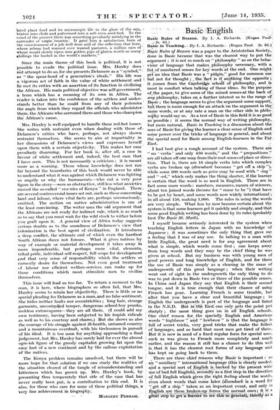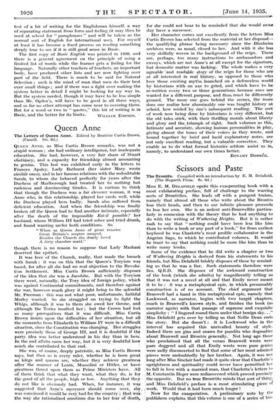Basic Thieish
Basic Rules of Reason. By 1.• A. Richards. (Kegan Paul* 2s. 6d.) Bisic in Teaching - -By-I. A.-Richards:. (Kegan Paul. 2s. 6d.)
Basic Rules of Reason. was a paper to the Aristotelian Society, done in Basic because that was the clearest way to put the argument ; it is not so much on" philosophy " as on the beha- vidur of language that makes, philosophy necessary, with a list of numbered senses for key. Words-at the end. One might get' an idea that Basic was a " pidgin," good for common use
bill not for thought ; the fact is if anylthing the opposite ;
it comes from the Cambridge 'schoril Of philosophy, and is most in comfort when talking of those ideas. So the purpose
ofithe paper, to give some of the mixed senses-at the back of any. philosophy, takes on a further interest as to the range of Bric ; the language seems to give the argument some support, but there is 1:I:min enough for an attack on the argument in the same words, or at any rate a man on the other side in philo- saOly would say so. As a test of Basic in this field it is as good as possible ; it seems the normal way of writing philosophy,
but more natural, Basic in Teaching is a discussion about the uses of Basic for giving the learner a clear sense of English and
some power over the tricks of language in general, and about the special need for 'Basic -among English-learners in the Fair East:
I had best give a rough account of the system. There are " no ' verbs ' and only 850 words," and the " prepositions 7 are all taken off one map from their root senses of place or direr- tion. That is, there are 18 simple verbs into which complex . verbs are broken up (disembark becomes " get off a ship "), While some 300 words such as price may be used with " -ing and " -ed," which only makes the thing.shorter, if the learner is certain that the word is so used in English. There are in fact some more words : numbers, measures, names of sciences, about ten joined words (become for " come to be ") that have .
to be got by heart, and some words now widely international ; in all about 150, making 1,000. The rules in using the words are very simple. What has by now become certain about the System is that some learners get it quickly and simply, and that some good English writing has been done by its rules (probably best The Bask St Mark).
I myself became seriously interested in the system when teaching English letters in. Japan. with no knowledge of Japanese.; it .was .sometimes the only thing that gave me a feeling that I was of any use. In talking to a man with little English, the great need is for any agreement abOut
what is simple, which words come first ; one keeps away from long words and they may be the chief thing he was given at school. But my business was with young men of good powers and long knowledge Of English, and for them
the use of Basic was simply as a clearing in the mass of undergrowth of this great language ; when their writing
went out of sight in the undergrowth the only thing to do
was to put down in Basic two or three of the possible senses. In China and Japan they say that English is their second tongue, and it is true enough that their chance of using French has gone. . Learning. French is some trouble, but after that you have a clear and beautiful language ; in English the undergrowth is part of the language and listed in the N.E.D. But m the Ease one only gets the point put sharply ; the same thing goes on in 'all English schools. One chief reason for the specially English and American words " highbrow " and " lovibrow." is that the language is full' of secret tricks, very good tricks that make the fullest of languages, and so hard that most men get tired of them. But it is now in need of a fixed regular form for special uses, such as was given to French more. completely and much earlier, and the reason it still has a chance to do this well is that it has the clearest root forms of any language and has kept on going back to them.
There are three chief reasons why Basic is important : as an " auxiliary " international language (this is clearly needefl, and a special sort of English is backed by the present wide use‘of bad full English), secondly as a first step in the direction of full English which gives the right feeling about the words, even about words that come later- (disembark is a word for `I get off a ship " taken as an important event, and only in English are these broken-on forms the normal ones it a greit stets i,o'gh'relf3arirertii i-Ce.triiihn' general), thirdi' as a
test of a bit of writing for the Englishman himself, a way of separating statement from form and feeling (it may then be used at school for " paraphrases " and will be taken as the normal sort of English for international use). For myself at least it has become a fixed process on reading something deeply true to see if it is still_ good sense in Basic.
The first copy of Basic English was printed in 1930, and there is a general agreement on the principle of using a limited list of words while the learner gets a feeling for the language. Naturally other teachers of teachers, an important body, have produced other lists and are now fighting over part of the field. There is much to be said for Natural Selection ; such is the mind of man that men do their best oyez: small things ; and if there was a fight over making the system better in detail I might be looking for my way in. But the system needed, though it may have to be less simple than Mr. Ogden's, will have to be good in all three ways, and so far no other attempt has come near to covering therm But for a word or two in " quotes," this bit of writing is in Basic, and the better for its limits. WILLIAM EMPSON.



















































 Previous page
Previous page